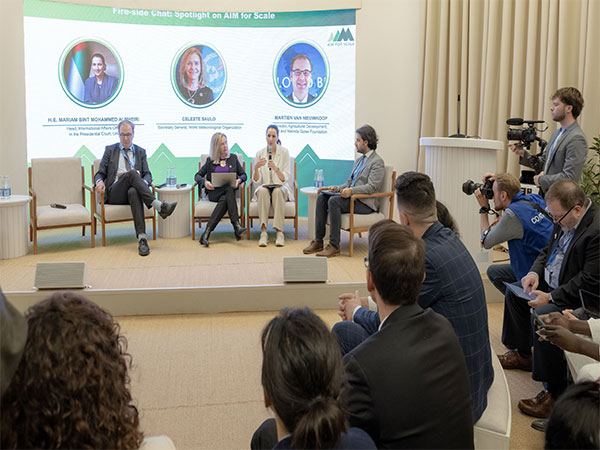Baku [Azerbaijan], November 16 (ANI/WAM): Mariam bint Mohammed Saeed Hareb Almheiri, Head of the International Affairs Office in the UAE Presidential Court, has announced that the UAE is developing the world’s first ChatGPT tool for the agricultural community.
The announcement came today at the UAE Pavilion at COP29 which hosted an exciting array of events focused on the transformative role of technology, collaboration, and data in accelerating decarbonisation and driving the energy transition around the world, particularly through agricultural innovation and hydrogen development.
In a session titled “In Partnering to Create AI-based Public Goods for One Billion+ Smallholders”, the announcement by Almheiri that the UAE is developing the world’s first ChatGPT tool for the agricultural community was applauded by all present. Already being referred to as “CHAG” (for Chat + Ag) and fully accessible, it will draw on 50+ years of research data and has come through the UAE’s exponential curve in the AI revolution; the world sees how the UAE has the capability and knowledge to develop large-language models like this. It will change the lives of farmers everywhere, especially those in difficult climatic conditions.
In the session with AIM for Scale, part of the UAE-Gates Foundation partnership, Almheiri, who is also Member of the International Humanitarian and Philanthropic Council, joined a panel, including the Gates Foundation, to discuss how farmers are being equipped with a vital tool to make informed decisions on when to harvest and plant seeds, and adapt to volatile weather patterns. “Instead of providing a general forecast, we are translating all this into something actionable for farmers with the power of AI,” said Celeste Saulo, Secretary General of the World Meteorological Organisation.
Sheikha Shamma bint Sultan bin Khalifa Al Nahyan, President and CEO of UAE Independent Climate Change Accelerators (UICCA), opened the day with the first session on Scaling Carbon Footprint Reduction in the UAE for unlocking carbon markets with international sustainable finance implications. In a wide-ranging discussion on green economic growth, Fanny Modin, Head of Business Development at Seagrass-E.ON, expressed that “the UAE is already showing a lot of leadership in the carbon markets sector and recognising them as a key financing instrument”. She described the ALTERRA fund as “a significant game-changer”.
In Tech and Social Innovation for Achieving Global Climate and Sustainable Development Targets, Zayed Sustainability Prize winners showed how start-up innovations can help make progress toward global climate and development goals through tech solutions. Winner Sebastian Groh, CEO of SOLShare, said: “It’s all about how we integrate decentralised with centralised solutions at scale. The most prevalent challenge is not technology – it is policy.” Taking up the sustainable energy and tech theme, Prize Judge and renowned French explorer Bertrand Piccard, presented his mission to circumnavigate the globe in a hydrogen-powered plane. “Hydrogen will come for aviation,” he stated.
In “The Role of Technology, Collaboration, and Data in Accelerating Decarbonization in the UAE”, Nadia Rouchdy, Head of Climate at Emirates Nature-WWF, offered the assurance that “it is normal for it to take time to decarbonise and important to get good data”. He had already seen “a lot of great UAE-based home-grown companies using AI to try to address emissions, build capacity, and find better ways to engage with suppliers on climate”. He was clear on COP28’s contribution: “COP28 was the convergence of health, nature and climate – the first time these intersections were featured at a COP conference. The COP28 legacy to me is how it made all the elements come together.”
A session on the power of AI on food systems innovation noted how AI and other innovative technologies can strengthen agricultural production and food resilience.
Another session on Advancing the Grid Through Innovation, with TAQA and the Utilities for Net Zero Alliance, explored technological advancements and collaborations to transform power grids globally for Net Zero by 2050.
To conclude, the sessions Advancing the UAE National MRV-Transparency System: Progress and Next Steps presented a key tool for monitoring GHG emissions and air quality through climate reporting. Harnessing AI to Accelerate the Energy Transition, a Changemaker Majlis hosted by Masdar and the Mohamed bin Zayed University of AI, noted the revolutionary role of AI to the energy transition. (ANI/WAM)












